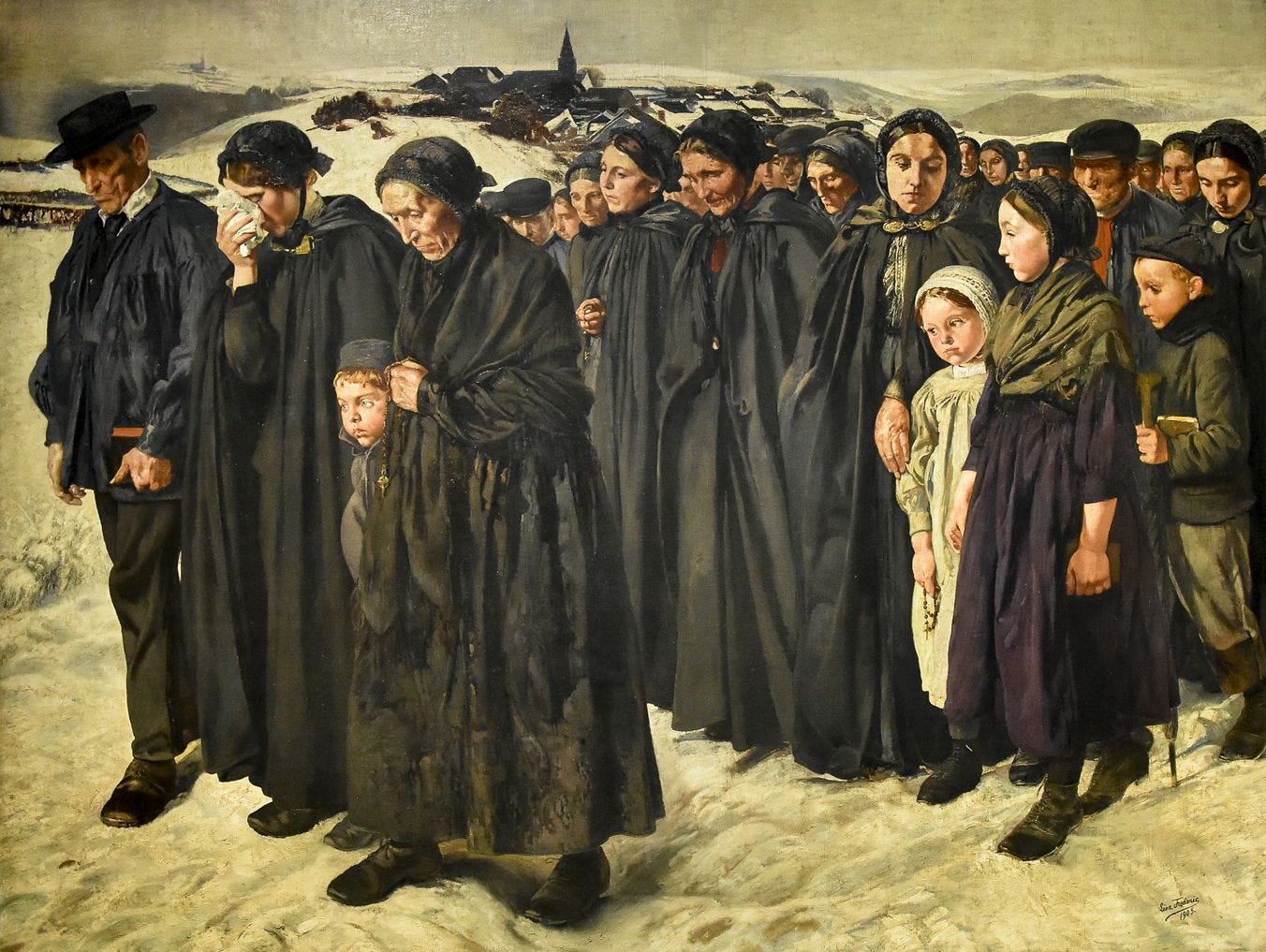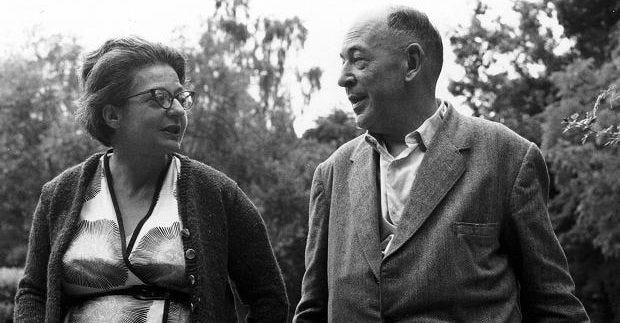CS Lewis on Grief, God and Suffering
What Lewis’ darkest moments teach us about faith and loss
In light of this week’s events, most notably the tragic killing of Charlie Kirk, I have decided to make today’s paid article free for everyone. It follows CS Lewis’ thoughts on grief, loss, and human suffering, recorded after his wife’s untimely death.
I hope you find his wisdom to be of use, and may we all remember to cherish our loved ones and precious time on this Earth.
Reminder:
Subscribe to support my mission of restoring Truth, Beauty, Goodness, and God to the heart of the West!
A Grief Observed
A Grief Observed is Lewis’ most tragic work. It’s a short collection of journal entries detailing his depression and spiritual crisis after his wife, Joy, passed from cancer.
From the opening lines, you notice Lewis’ tone is starkly different from his usual jovial self:
“No one ever told me that grief felt so like fear. I am not afraid, but the sensation is like being afraid. The same fluttering in the stomach, the same restlessness, the yawning…
It feels like being mildly drunk or concussed. There is a sort of invisible blanket between the world and me.”
Lewis and Joy had only been married for three years, but her passing gutted him like she was his lifelong partner. He says this “drunken,” feeling follows him everywhere — work, leisure, amongst friends — life has reduced to a numb and bitter banality.
You might expect that in such hard times, Lewis, the famous Christian apologist, would turn to God for comfort… but the opposite happens.
He doesn’t cry out to God, rather he puts his entire faith on trial…
Anger at God
Lewis doesn’t mince words about his anger.
He writes:
“I am not in much danger of ceasing to believe in God. The real danger is coming to believe such dreadful things about Him. The conclusion I dread is not, ‘So there’s no God after all,’ but, ‘So this is what God’s really like. Deceive yourself no longer.”
These blunt words are disturbing and are a testament to the limitless abyss that grief can send you to. Lewis himself, in later chapters will say that this writing scares him, but here’s the twist:
Lewis’ anger here is not heretical.
It’s not the product of a weak hearted faith, nor a sin against God, nor even a personal shortcoming. In fact, it’s the opposite — his writing begins a healing process that doesn’t just settle grief, but builds a true faith in God.
His anger actually has resonance in Scripture itself.
Consider the book of Psalms — a book of prayers to God — which has an entire genre of prayer called Lamentation. These are prayers of grief, tears, and anger to God in response to suffering, loss, and illness. In other words, Scripture instructs us to call to God in anger when we suffer.
It’s perhaps no coincidence that God didn’t appear to Job — the suffering servant — until Job accused God in his anger. And of course, Christ himself cried out on the cross: “Why hast thou forsaken me?”
Surprisingly then, Lewis’ crisis of faith does not show weakness of character, rather his despair proves instructive — it reveals what an authentic wrestling with God actually looks like.
But where does this grief lead Lewis to?
A House of Cards
Lewis’ grief never goes away (at least not by the end of this book), but what takes the place of fear and confusion is wisdom and understanding.
He writes:
“God has not been trying an experiment on my faith or love in order to find out their quality. He knew it already. It was I who didn’t.
He always knew that my temple was a house of cards. His only way of making me realize the fact was to knock it down.”
Lewis reminds us that suffering is not a “test,” to prove ourselves to God, rather suffering is an invitation to self-knowledge — an opportunity for us to discover our true selves.
It’s easy to praise God from behind the luxuries of an ivory tower, yet you rarely experience God in such places of prestige, comfort, or lavishness. You don’t experience him in palaces, rather he calls his flock to the desert (Abraham, Moses, Christ himself, etc.)
Such is the heart of the Christian narrative — there is no resurrection without a crucifixion. A heavy, bloody cross, is the intermediary between Heaven and Earth.
As such, Lewis reminds himself that Christianity may be a religion of great promises, but certainly not false comforts:
“Talk to me about the truth of religion and I’ll listen gladly. Talk to me about the duty of religion and I’ll listen submissively. But don’t come talking to me about the consolation of religion or I shall suspect that you don’t understand.”
Indeed the Christian life is no easy life. It’s a heavy burden, and a long road through a valley of tears amongst the shadow of death… but such a road and its troubles are never without their reward.
As Lewis himself discovers, this very road of heartbreak is worth taking…
Conclusion
As I suggested earlier, there’s no “happy ending,” to A Grief Observed.
No writing can change the fact that Lewis’ wife died, and he misses her dearly. Let us remember, however, that suffering alone is not an evil. In Lewis’ case, his very misery carries with it an unspoken triumph.
He writes:
“Looking back, I see that only a very little time ago I was greatly concerned about my memory of [my wife] and how false it might become. For some reason, I have stopped bothering about that. And the remarkable thing is that since I stopped bothering about it, she seems to meet me everywhere.”
What’s going on here? Why did he let his wife go, and why does she now “meet him everywhere?”
Lewis’ love has matured.
His book began in fear — “no one told me grief felt like fear” — of losing the memory of his wife Joy. This fear led to an unhealthy attachment, a desire to cling to a soul called home.
Yet as the saying goes, “if you love her, let her go,” and that’s what Lewis did. By the end of this entry, his grief leads him to an acceptance of Joy’s death, yet in this very acceptance, Lewis is surprised to get her back:
She “meets him everywhere.”
He stresses these meetings aren’t literal angelic visitations, rather it’s a subtly felt realization of her presence. As such, Joy’s memory is now an ever present reminder and testimony of not just her life, but a reminder of the promises to come after death.
Such is the reminder of the Cross itself — not a memory of the Crucifixion — but a reminder of the promises on the other side.
Grief may be horrible, tragic, and even endless, but if such grief is aimed at God, one is assured that their soul is ascending in that very moment. Such heartbreak is never mourned in vain, and such prayers never fall upon deaf ears.
The moment you feel most abandoned is but the moment that Providence, in his trademark act of cosmic irony, may very well be shining his brightest lights upon your being.
Thank you for reading!
Subscribe for free if you would like weekly emails on the Great Books, and their life lessons on Truth, Beauty, and Goodness
And remember:
Paid members receive an additional members only email every week!







I read CS Lewis so many years ago, this helped to remind me of how much we need to remember his life and work.
What a beautiful summary of Lewis’s beliefs, which you summarised so brilliantly in your line: “In Lewis’ case, his very misery carries with it an unspoken triumph.” 👏👏